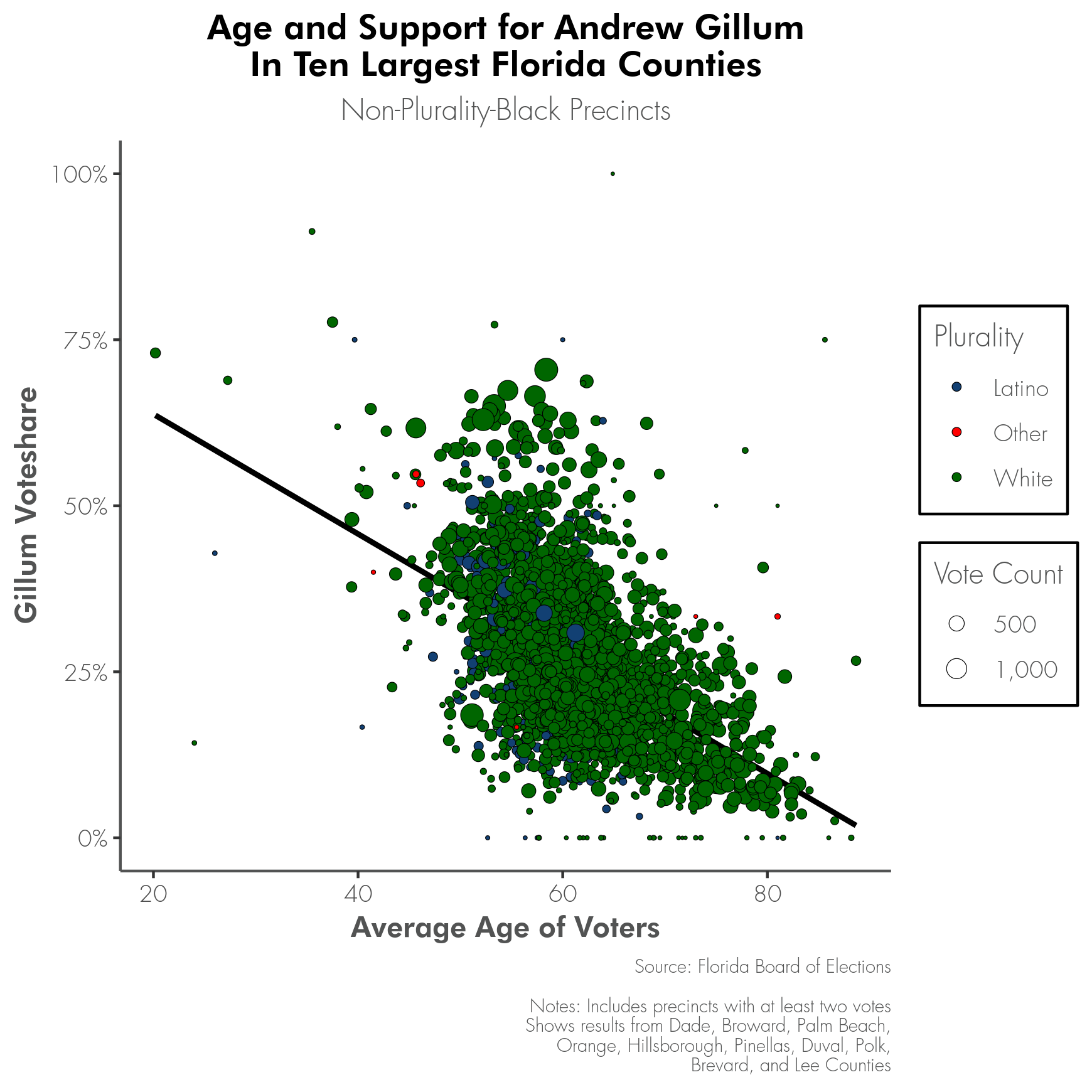data for politics #26: Florida Primaries
By Kevin Morris (@ktnmorris)
Five hundred and thirty-seven.
That, of course, was George W. Bush’s margin of victory over Al Gore in Florida in the 2000 presidential election. The race in Florida and the Supreme Court’s subsequent bequeathment of the presidency to Bush the Second altered the course of American politics and policy over the past two decades, and its echoes will continue for a long time to come.
More recently, Donald Trump beat Hillary Clinton by 1.2 percent in 2016, again playing an outsized role in the up-fucking of the United States.
There is, however, good reason to be excited about the ballots being marked by Floridians this fall.
Let's start with ballot initiative Four.
In Florida, folks with felony convictions are permanently disenfranchised unless they're individually pardoned. This fall, Floridians will choose whether or not to amend the state constitution to change this law for some (but not enough, in this author's opinion) individuals. The ballot initiative needs 60 percent to pass, and the polling looks good. To put this in perspective: should ballot initiative four pass, it will be the biggest expansion of voting rights since the passage of the 19th Amendment in 1920, recognizing women’s right to vote. This is a big deal.
The gubernatorial race is equally exciting. Ron DeSantis, a pro-Trump (like, disturbingly pro-Trump) ex-congressperson will face off against progressive Andrew Gillum. Because both of these folks won competitive primaries in August, we have a reasonably good sense of how voters are feeling about them.
If you followed our coverage of the federal primaries in New York City (where Alexandria Ocasio-Cortez beat Joe Crowley, and Adem Bunkeddeko nearly defeated Yvette Clarke), this will come as no surprise to you. In the Florida Democratic gubernatorial primary, the progressive candidate succeeded with outsized support from voters in younger precincts. But, given that this is Florida, the average age in the Democratic primary was 60.3, and the average age in the Republican primary was 63.6. This chart shows demographics on individuals who cast ballots in the August 28th primary:
Gillum, of course, is a black man, so it's perhaps not surprising that black precincts supported him regardless of age. When we exclude plurality-Black precincts, this becomes even more evident:
On the other hand, we see no such support among younger voters in the Republican primary. In fact, DeSantis won decidedly less votes in precincts with younger voters:
There are very few plurality-Black Republican precincts (who'd have thought Black Americans are more turned off by the explicit racism central to the modern Republican Party??!!), but here's the chart for folks looking for apples-to-apples comparisons:
The trend is clear: younger Democrats who cast primary ballots are more likely to support Gillum than their older neighbors, and younger Republicans are less likely to support DeSantis. This sets up an interesting dynamic with a high potential for Republican defection among younger voters - precisely the voters unlikely to be accounted for in the polls that show the race as remarkably close.
Adding to the intrigue is what happened in the 2016 presidential election. Across the board, more Democrats voted for Trump than Republicans voted for Clinton. The chart below shows Republican defection: we take the percentage of voters who were registered Republicans in each precinct, and subtract from that the share of the precinct’s votes cast for Trump. Positive voters show places where a higher share of voters were Republican than votes cast for Trump; negative numbers, the opposite:
This is a rough chart. Trump over-performed pretty much across the board, to the dismay of decent people everywhere. (Unsurprisingly, he underperformed in plurality-Latino precincts, since his anti-Latino racism was especially pronounced in the contest.) He over-performed less, however, in younger districts. To everyone's delight (including Sean, who may want to kill off Republicans?), young people were a little more successful at resisting the siren call of the Blowhard-in-Chief.
Because our democracy is on the verge of bankruptcy, Florida's deeply-uncompetitive federal senatorial primaries don't tell us very much. Rick Scott, current governor and forever asshole, handily won his primary race. The Democratic primary, lol, didn't even happen. That's right - a major-party senatorial primary went entirely uncontested in the country’s third biggest state. How's that for a representative democracy?
At least younger precincts were less likely to support Scott, though if it were up to them he still would have been handed the nomination on a silver platter:
So putting all of this together, what does it mean?
Well, we know traditional polling methods have a tough time capturing the preferences of younger voters (what precisely is the function of a landline? Is that the same as a checkbook?)
When we combine the lack of real representative knowledge about how younger voters are leaving, it makes sense to look to actual electoral outcomes. And races from this year and 2016 make clear not only that younger Democrats are more likely to support more progressive candidates in Florida and elsewhere, but also that younger Republicans are less likely to put up with their party’s bullshit. The polls are close - DeSantis doesn't have a big edge in them. Combining what we know from the polls with what we know from actual elections, there's good reason to be optimistic about the Sunshine State.
But listen, folks - this all depends on younger folks showing up. So get your friends and your family and anyone else you know who lives in Florida to turn the fuck out, and to get their networks activated. That's how this stuff works - friends telling friends who to vote for. Little by little, decent humans have a chance to take back power from the evil people who currently have a stranglehold on our country. Let's do this







